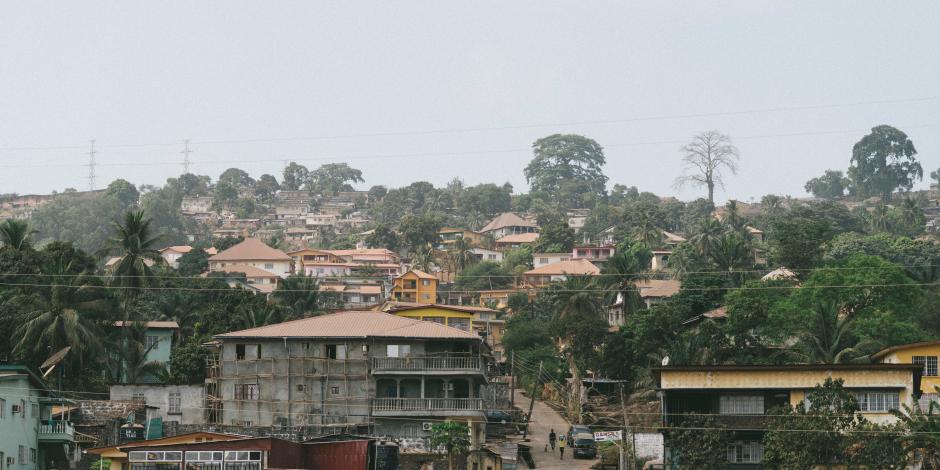Starten Sie den Audio-Text
Mit dem Audio-Player können Sie sich den Text anhören. Darunter finden Sie das Transkript.
Eugenia Kargbo has an unusual career: She is Africa’s first-ever heat officeretwa: Beauftragte(r) für die Auswirkungen extremer Hitzeheat officer. Based in Freetown, the capital of Sierra Leone, Kargbo has seen how the city has changed over the years and how the number of green spaces has gradually reduced over time. Now, she works to to raise awareness of/for sth.das Bewusstsein für etw. stärken, für etw. sensibilisierenraise awareness of the dangers of extreme heat, improve responses to heatwaveHitzewelleheatwaves and analyze the effect of extreme heat on the city. Business Spotlight correspondent Rachel Preece spoke to Eugenia Kargbo about her career in the following interview. Ready? Let’s go!
Rachel Preece: Can you tell me a little bit about your childhood in Freetown and how has the climate changed since you were a child?
Eugenia Kargbo: I grew up in Freetown. My family lives here. Nature has always been my happy place. And when I had an opportunity to work with the councilRat; hier: Stadtratcouncil — the Freetown City Council and the mayorBürgermeister(in)Mayor’s delivery unithier etwa: Stabsstelle für gemeindliche ProjekteDelivery Unit, I had an opportunity to work in the sanitationhier etwa: öffentliche Hygienesanitation and environment space. I became the lead of the sanitation team around 2019. I started working on a series of interventions alongside different partners, and I was given an opportunity to lead the closureSchließungclosure of an illegal dumpsiteMülldeponiedumpsite, and so, that opportunity was an to be an eye-opener (ifml.)(jmdm.) die Augen öffnen, ein Signal (für etw.) seineye-opener as to what are the problems, what are the challenges and the pathwayWeg; hier auch: Richtungpathway that Freetown is moving towards, compared to where we were before.
Freetown used to be a very beautiful city with coastal areas and hillsides with lots of trees and flowers. It was really, really beautiful, but over the last 20 years, we’ve seen that beauty gradually to fade awayverblassenfade away due to urbanization and to be driven by sth.von etw. angetrieben werdendriven by climate change. We’ve seen the population of the city more than doubled, from 500,000 to now more than 1.2 million people. And this is as a result of climate migration. A lot of the people in the ruralländlichrural areas depend on subsistenceEigenbedarf, Selbstversorgungsubsistence farming. When it rains when it shouldn’t and doesn’t when it should, that leads to low crop productivityErnteertrag/-erträgecrop productivity.
And so, a lot of people have left the rural area in search of greener in search for greener pastureshier: auf der Suche nach besseren Möglichkeiten [pasture: Weide(land)]pasture. And most of those people are now to residewohnenresiding along the hillsides and coastlines, which has led to massive deforestationAbholzung, Rodungdeforestation. So, at the moment, that’s the situation that we’re facing. And the population keeps growing. And that, combined with the lack of urban planningStadtplanungurban planning, has been a problem.
Rachel: When you tell people about your rolehier: Aufgabe, Funktionrole, how do they react?
Eugenia: So, I spend a lot of time explaining my role and the importance of why I was to appoint sb.jmdn. ernennenappointed. But then, when you start to drive the conversation, they are like “Oh, yes!” because it’s not a strange thing. People are experiencing it, and they know that temperatures are rising.
Rachel: What measures have you and the council taken to to raise awareness of/for sth.das Bewusstsein für etw. stärken, für etw. sensibilisierenraise awareness of climate change and to improve conditions in Freetown?
Eugenia: It’s very important and criticalwesentlich, unerlässlichcritical for us to understand the context of extreme heat within the Freetown dynamics. What we did was to develop routes across the city, looking at different geographical space and different communities, and using humidityFeuchtigkeithumidity sensors and air ventLüftungsöffnungair vents to collect the data to understand where the hotspots are, look at different spatial dynamics, but also understanding the link between air quality and extreme heat, because there’s a lot of pollution(Umwelt-)Verschmutzungpollution, and build that into a comprehensive adaptationAnpassungadaptation plan for the city. We did that in partnership with local volunteerFreiwillige(r), Ehrenamtliche(r)volunteers in Freetown. It was a three-day event. So, the first day we focused on the data collection alongside raising the awareness. So, we had 12 rally stationSammelplatzrally stations in the different parts of the city, and we had community volunteers to man sth.etw. mit Personal ausstattenmanning those rally points, who were giving out water with heat messaginghier: Daten, Nachrichtenmessaging. We were giving out stickers. We were putting stickers on vehicleFahrzeugvehicles. The mayor was out with us. We were talking about it, and it was an amazing (ifml.)toll, fantastischamazing experience. And at the end of the day, the results from the mappingKartierung, Abbildungmapping were collected. And, on the community resilienceBelastbarkeit, Resilienzresilience side, I have been working on natural-based solutions and looking at different interventions on that, so I’ve been supporting the “Freetown the Treetown” project, which aims to plant a million trees across the city. The goal is to to reforest sth.etw. aufforstenreforest deforested areas, but also to provide livelihoodLebensunterhaltlivelihood and employment opportunities. So, at the moment, we’re at 70 per cent in achieving our targetZieltarget. We’ve planted over 700,000 trees. We’ve employed over 500 community people, who are established tree stewards, and so they’re responsible to plant the tree, to to monitor sth.etw. beobachten, kontrollierenmonitor the tree, to to maintain sth.etw. erhalten; hier: pflegenmaintain the tree and produce the reports to the city.
Rachel: You’re doing very important work, and it sounds like you’re very to be passionate about sth.etw. leidenschaftlich gern tunpassionate about it. Thank you ever so much for your time, Eugenia.
Eugenia: Thank you, Rachel. Thank you, too.
Rachel: I wish you all the best for the future.
Eugenia: Thank you. Thank you so much.
Rachel: Bye.
Eugenia: OK. Bye.
Neugierig auf mehr?
Dann nutzen Sie die Möglichkeit und stellen Sie sich Ihr optimales Abo ganz nach Ihren Wünschen zusammen.



